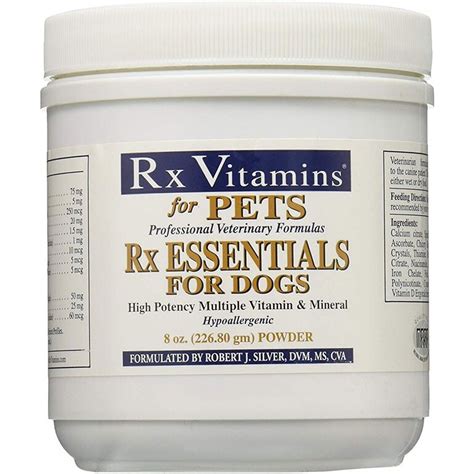Introduction
Just like humans, our furry companions require a healthy and balanced diet to live long and fulfilling lives. Among the essential nutrients that pets need, vitamins play a crucial role in maintaining their overall well-being. From boosting their immune systems to ensuring healthy skin and coat, vitamins are the unsung heroes of pet health.

The Essential Role of Vitamins in Pet Health
1. Immune System Boosters
Vitamins play a vital role in supporting the immune system. Vitamin A, for instance, helps produce antibodies that fight off infections. Vitamin C, known for its antioxidant properties, protects cells from damage. Vitamins E and K contribute to the proper functioning of the immune system, ensuring your pet is well-equipped to fight off diseases.
2. Healthy Skin and Coat
Vitamins, particularly vitamin A and biotin, are essential for healthy skin and a lustrous coat. Vitamin A aids in skin cell renewal, keeping the skin healthy and free from infections. Biotin, also known as vitamin H, promotes healthy hair growth and helps keep your pet’s coat looking vibrant.
3. Energy Production
Vitamins B complex, such as thiamine, riboflavin, and niacin, play a key role in energy production. These vitamins help convert food into energy, ensuring your pet has the fuel it needs for active play and daily activities.
Common Vitamin Deficiencies in Pets
Unfortunately, even with a well-balanced diet, pets can sometimes develop vitamin deficiencies. The most common deficiencies include:
1. Vitamin A Deficiency
Symptoms: Dry eyes, night blindness, skin infections, stunted growth
2. Vitamin D Deficiency
Symptoms: Bone weakness, muscle weakness, poor appetite, seizures
3. Vitamin E Deficiency
Symptoms: Muscle weakness, reproductive problems, immune system suppression
Vitamin Supplementation: When to Consider
While a balanced diet should provide your pet with the necessary vitamins, there are situations where supplementation may be beneficial:
1. Growing Puppies and Kittens
Growing animals have high vitamin needs to support their rapid development. Supplementation can ensure they get the essential vitamins they need.
2. Senior Pets
As pets age, their ability to absorb vitamins from food may decline. Supplementation can help prevent deficiencies and ensure optimal health.
3. Pregnant or Nursing Pets
Pregnant and nursing pets have increased vitamin requirements. Supplementation can provide the extra nutrients they need to support their own health and that of their young.
4. Pets with Health Conditions
Certain health conditions can impair vitamin absorption or increase the body’s need for specific vitamins. Supplementation can help manage these conditions and promote recovery.
Choosing the Right Vitamin Supplement
When choosing a vitamin supplement for your pet, it’s important to consult with your veterinarian to determine the specific needs of your animal. Look for high-quality supplements that contain a comprehensive range of vitamins in appropriate amounts. Avoid supplements with artificial ingredients or fillers.
Preventing Vitamin Toxicity
While vitamins are essential for pet health, over-supplementation can be harmful. Excess levels of some vitamins can lead to toxic side effects. Always follow the recommended dosage and consult with your veterinarian before giving your pet any supplements.
Real-Life Examples of Vitamin Benefits
1. Protecting Blindness
Vitamin A supplements have been shown to protect against night blindness in dogs who are prone to the condition due to a genetic mutation.
2. Boosting Immune Response
Studies have found that vitamin C supplementation can enhance immune function in cats with respiratory infections.
3. Improving Coat Quality
Vitamin Biotin is often included in supplements for dogs and cats with skin and coat problems. It has been shown to improve coat health and reduce shedding.
Tips and Tricks
- Feed your pet a balanced and nutritious diet to ensure they get the vitamins they need.
- If your pet has a specific health condition, consult with your veterinarian about potential vitamin supplementation.
- Choose high-quality vitamin supplements that are appropriate for your pet’s age, breed, and health needs.
- Follow the recommended dosage and avoid over-supplementation.
- Monitor your pet for any signs of vitamin deficiency or toxicity and consult with your veterinarian promptly if any concerns arise.
FAQs
1. Are all vitamins safe for pets?
No, certain vitamins can be toxic to pets if taken in excessive amounts. Always consult with your veterinarian before giving your pet any supplements.
2. What are the signs of vitamin deficiency in pets?
Symptoms of vitamin deficiency vary depending on the specific vitamin but may include dry skin, dull coat, lethargy, and weight loss.
3. Can I give my pet human vitamins?
No, human vitamins are not formulated for pets and may contain ingredients that are harmful to animals. Always use pet-specific vitamin supplements.
4. How often should I give my pet a vitamin supplement?
The frequency of vitamin supplementation depends on your pet’s age, health, and diet. Consult with your veterinarian for specific recommendations.
5. What is the best way to administer vitamin supplements to my pet?
Vitamin supplements can be added to food, mixed with water, or given as treats, depending on the product and your pet’s preference.
Conclusion
Vitamins are essential nutrients that play a pivotal role in the health and well-being of our beloved pets. By ensuring our furry companions have access to the vitamins they need, we can help them live longer, healthier, and happier lives. Remember, vitamins are not just nutrients; they are superheroes that keep our pets fighting fit and glowing with vitality.





















